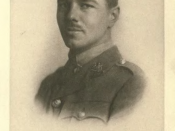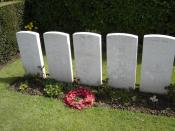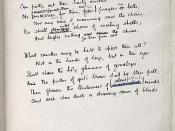"My subject is war and the pity of war. The poetry is in the pity." - Wilfred Owen.
Owen wrote his poetry to suit many different purposes. It's speculated that before joining the war he, like many others including Rupert Brooke, wrote propaganda poetry to maybe celebrate the event. However, the purpose of his poetry undergoes a drastic change when faced with reality as portrayed in various poems, and it is for this that he is best known.
In October 1917, Wilfred Owen wrote to his mother from Craiglockhart, "Here is a gas poem, done yesterday." Owen himself put his ironically titled poem, Dulce Et Decorum Est into the generic title: 'Indifference at home'. The poetry holds no compassion and so you are not meant to feel for the soldier, but the emotion that does rise from the verses is anger.
In my opinion, this anger is directed at the 'old friend', Jessie Pope who wrote propaganda in the guise of poetry.
The phrase that he uses, "With such high zest," seems to neatly tie up his attack against Pope's work. The images that he uses create a devastating contrast with the idea that it is glorious to die for you country. He is rallying against the classic idea of duty to your country.
I feel that contrary to the earlier quote used above, the intention was not so much to induce the feelings of pity in this case but to shock. I also think that this was directed at those who thought of the war as glorious and altogether beautiful. These things alone would have shocked people who didn't know what was going on, but they were realistic images. Owen was a poet who was influenced by the Georgians, and later the Imagists, and therefore told things...


